Key takeaways:
- Green hospitality encompasses a philosophy of sustainability at all levels, emphasizing eco-friendly practices like sourcing local products and using biodegradable amenities.
- Engaging employees in sustainability efforts creates a culture of responsibility, inspires innovation, and enhances the guest experience.
- Utilizing eco-friendly cleaning products improves health and workplace satisfaction while reducing environmental impact.
- Measuring impact through data and continuous improvement leads to informed decisions and fosters progress in sustainability initiatives.

Understanding Green Hospitality Best Practices
When I first delved into green hospitality, I realized it goes beyond just having solar panels on the roof. Best practices encompass an entire philosophy that prioritizes sustainability at every touchpoint, from purchasing eco-friendly amenities to minimizing waste. Have you ever stopped to consider how your choices, like using biodegradable cleaning products, can impact both guests and the environment?
One standout experience for me was witnessing a hotel completely revamp its approach to food sourcing. They embraced local suppliers, reducing their carbon footprint while supporting the community. It’s amazing how the simple act of shifting to local produce not only enhanced the menu but also bolstered the local economy. Can you imagine the positive ripple effect that such choices can create?
Moreover, effective energy management in hospitality can drastically change operational costs. I recall a hotel that implemented smart heating and cooling systems, significantly reducing energy expenses while still maintaining guest comfort. Isn’t it inspiring to see how technology can drive sustainability? Embracing such innovations is not just a trend; it’s a necessary step for the future of hospitality.
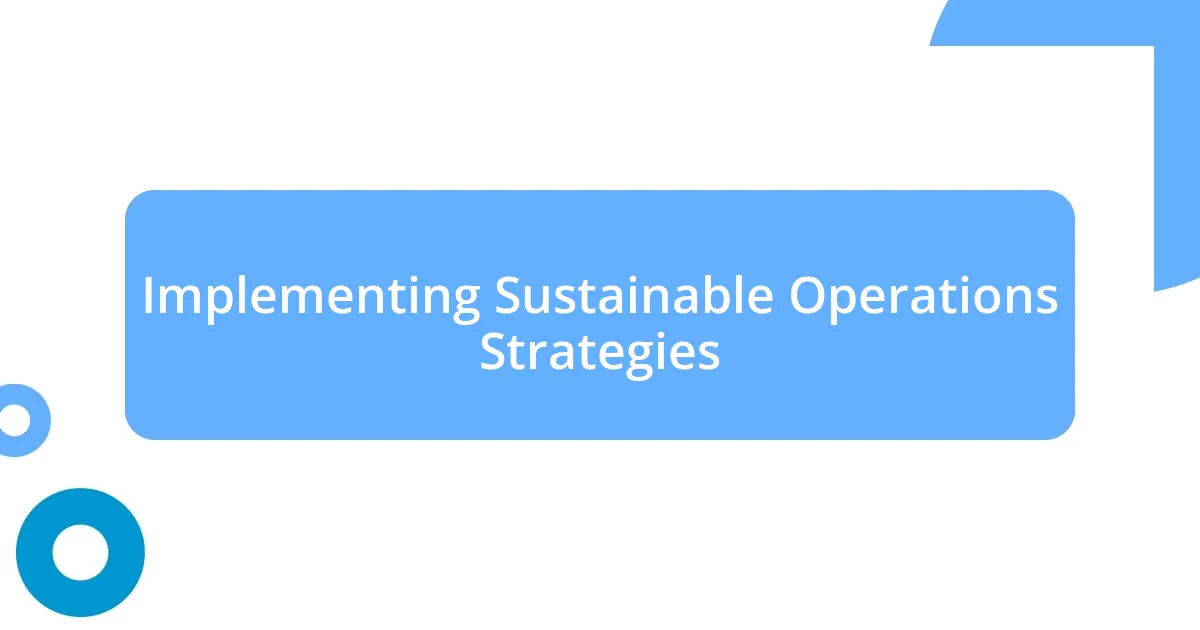
Implementing Sustainable Operations Strategies
Sustainable operations strategies can really transform the daily workings of a hospitality business. I remember visiting a charming inn that took its commitment seriously by implementing a zero-waste approach. The staff was genuinely proud of their initiatives, from composting food scraps to repurposing old linens. It wasn’t just about cutting costs; it was about creating a culture where every employee felt they had a role in safeguarding the planet.
Here are several effective strategies I’ve encountered:
- Energy Efficiency Audits: Regularly assess energy usage to identify areas for improvement.
- Sourcing Local Products: Build partnerships with nearby farms and businesses to support the local economy.
- Engaging Employees: Foster a team-oriented approach where employees contribute ideas for sustainable practices.
- Guest Education Programs: Inform guests about the hotel’s sustainability efforts, inspiring them to participate.
- Digital Check-in: Reduce paper waste by encouraging guests to check in through mobile apps.
Each of these strategies not only benefits the planet but also enhances the guest experience. I vividly recall a hotel that introduced guest participation in their sustainability initiatives, and I saw firsthand how it made visitors feel more connected to their surroundings. The excitement and pride from both the guests and the staff were palpable, reinforcing the idea that sustainability can be a thrilling and collective journey.
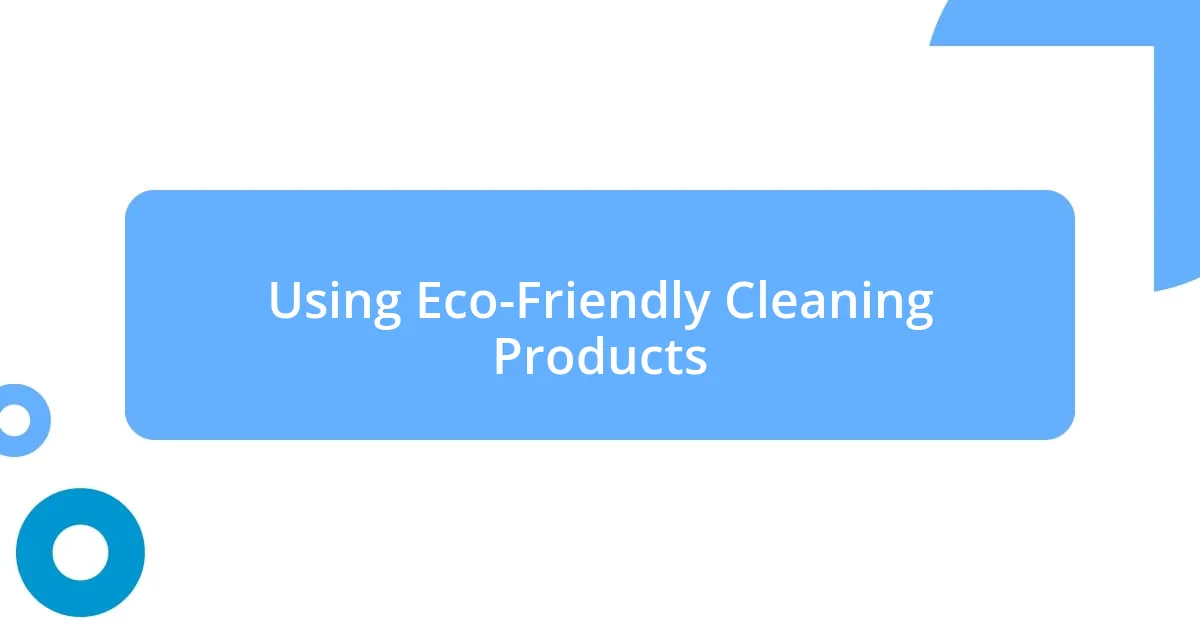
Using Eco-Friendly Cleaning Products
Using eco-friendly cleaning products is a vital aspect of any green hospitality effort. I once visited a boutique hotel that focused on using plant-based cleaners. The fresh scent of citrus filled the air, creating an inviting atmosphere. I found it fascinating that these products not only made the rooms sparkle but were also safe for the staff and guests, emphasizing a deep commitment to health and wellness alongside environmental concerns.
In my experience, traditional cleaning products often contain harmful chemicals that can irritate the skin or cause allergic reactions. After witnessing the impact of switching to natural alternatives, I felt relief knowing that eco-friendly options did the job just as well, if not better. One memorable moment was chatting with the housekeeping staff, who expressed how much they loved working with these non-toxic solutions. Their enthusiasm was contagious, and it became apparent that using better products also contributed to a more enjoyable work environment.
To highlight the differences, I find it helpful to compare traditional cleaning products versus eco-friendly alternatives.
| Feature | Traditional Cleaning Products | Eco-Friendly Cleaning Products |
|---|---|---|
| Health Impact | May cause allergies or chemical burns | Safe for skin and respiratory system |
| Environmental Impact | Contribute to pollution | Biodegradable, non-toxic ingredients |
| Effectiveness | Often require strong chemicals | Potent natural ingredients work effectively |
| Employee Experience | Potential discomfort due to fumes | Healthier workplace, greater job satisfaction |
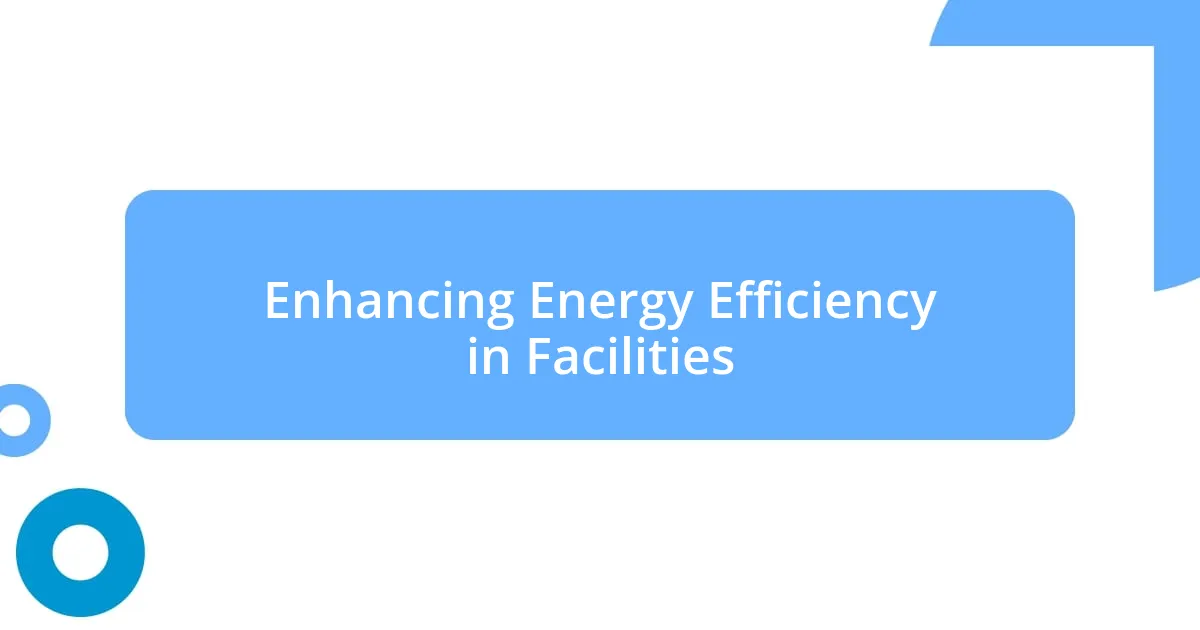
Enhancing Energy Efficiency in Facilities
Enhancing energy efficiency is crucial in hospitality facilities, and I’ve seen the transformation that comes from simple changes. One memorable experience was at a resort that switched to LED lighting. The difference was striking—not only did it cut their energy bills significantly, but the ambiance improved because of the warm, inviting glow. It made me think: why hasn’t every facility made this switch yet? The long-term savings and positive guest experience are undeniable.
In my travels, I’ve come to appreciate the role of smart thermostats in managing energy use. During a recent stay, I noticed the hotel had installed these devices in every room. Guests could adjust the temperature based on their preferences while the system optimized energy consumption automatically when rooms were unoccupied. This made me feel empowered as a guest. It’s a win-win when technology not only improves comfort but also works towards a greener planet.
Another effective strategy I encountered was enhancing energy efficiency through comprehensive employee training. At one establishment, I attended a workshop on energy-saving practices—from turning off unused equipment to encouraging mindful usage of resources. The shared sense of responsibility I observed among staff was inspiring. They weren’t just employees; they became ambassadors for sustainability. I often wonder how many other businesses are missing out on this powerful alignment of purpose and practice.

Promoting Local and Organic Food
Promoting local and organic food has been a transformative journey for many hospitality venues, and I’ve seen this firsthand. While visiting a small inn nestled in the countryside, I was struck by their commitment to sourcing ingredients from nearby farms. There was something incredibly refreshing about savoring a salad prepared with heirloom tomatoes and greens picked that very morning. It made me wonder: how often do we miss out on the flavors that only local produce can provide?
On another occasion, I was invited to a farm-to-table dinner at a charming bed and breakfast. The chef passionately explained how each dish showcased seasonal ingredients from local growers. As I enjoyed my meal, I felt more connected to the community and its chefs. It was inspiring to witness such an environmentally-conscious effort where supporting local agriculture wasn’t just a buzzword but a vibrant practice. It made me reflect on how my dining choices can resonate beyond just my plate.
I believe there’s a profound joy in celebrating local cuisine. When hotels and restaurants prioritize organic and sustainable food sources, they cultivate a unique dining experience that guests remember. During one of these meals, I couldn’t help but think about how this approach not only nourishes the body but also fosters a greater sense of responsibility towards our planet. Isn’t it fascinating how enjoying a meal can become a catalyst for ecological mindfulness?
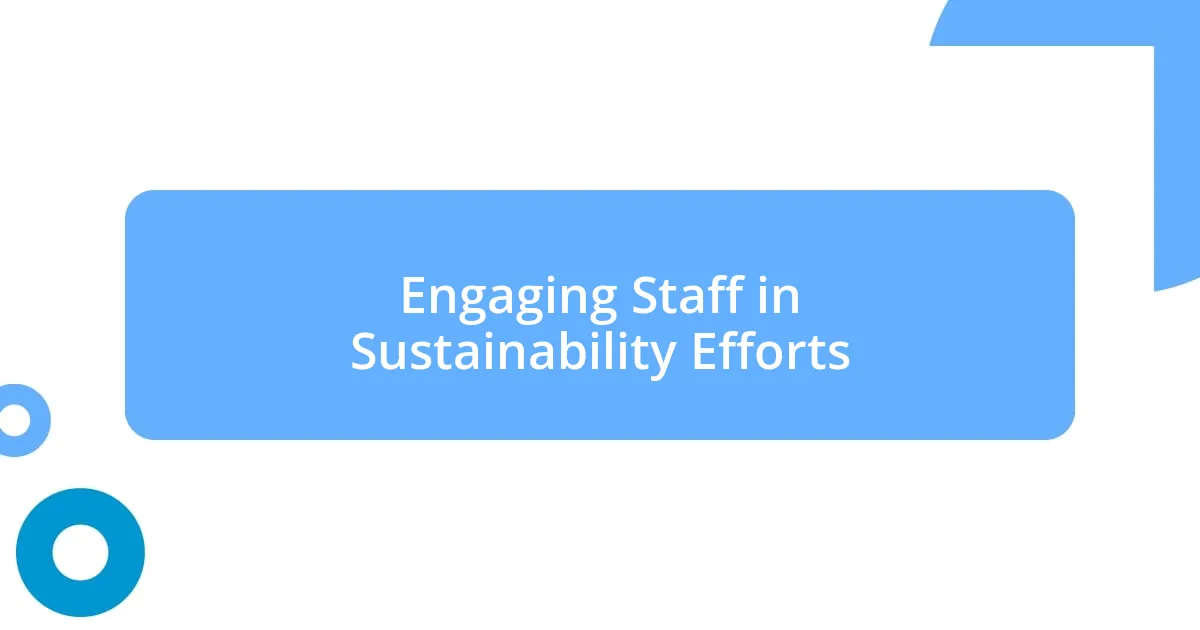
Engaging Staff in Sustainability Efforts
Engaging staff in sustainability efforts is a journey I’ve found surprisingly rewarding. In one hotel where I worked, the management initiated monthly sustainability meetings for all employees. Staff members shared innovative ideas, such as creating a recycling program for toiletries. It was empowering to see my colleagues take ownership—who would have thought that a simple gathering could spark such creativity?
I remember leading a “Green Day” at a resort, where we organized activities like planting trees around the property. The energy and enthusiasm were contagious. When I witnessed staff bonding while working toward a common goal, I realized that connection strengthens our commitment to sustainability. How often do we miss opportunities to engage our teams with hands-on activities that foster teamwork and environmental stewardship?
Incorporating sustainability into daily routines requires ongoing dialogue, and training can’t be a one-time event. I recall a hotel that implemented an engaging recognition program where staff earned badges for their sustainable actions, from reducing waste to conserving water. This gamification of sustainability not only motivated the team but also created a fun and competitive spirit. Isn’t it exciting to think that even small actions can combine to create a lasting impact on our planet?
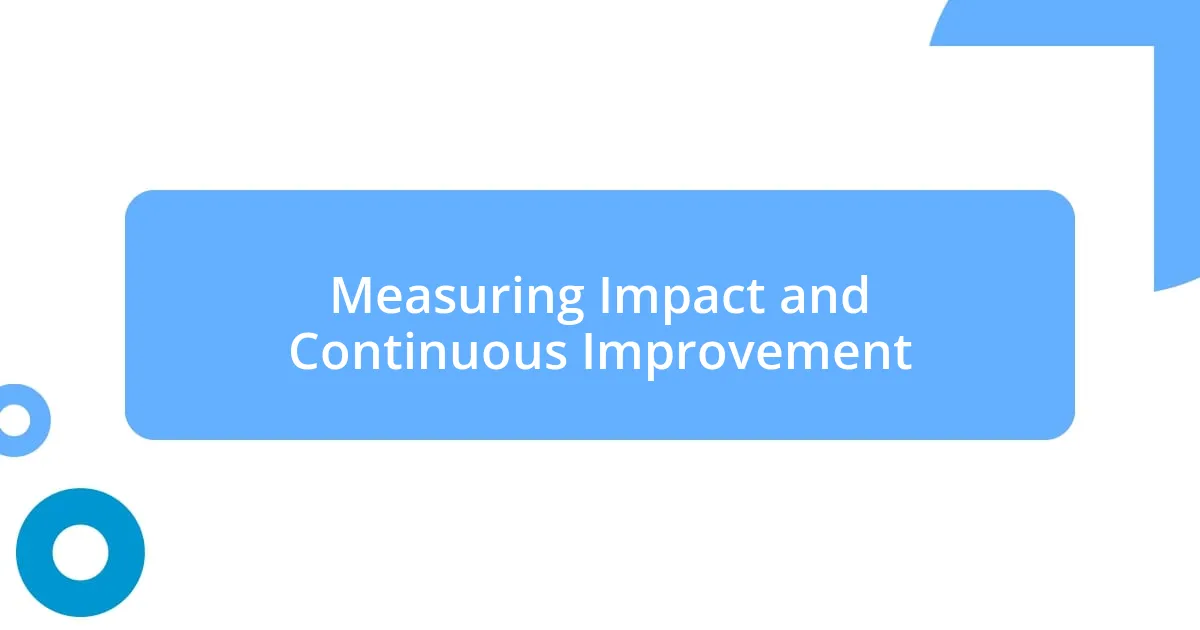
Measuring Impact and Continuous Improvement
Measuring impact in green hospitality often feels like both a challenge and a rewarding adventure. I remember the first time I sat down with spreadsheets and data collected from energy usage in a hotel I managed. As I analyzed the numbers, it clicked for me how metrics weren’t just cold figures but stories of how our actions directly affected resource consumption. What I learned is that by tracking these details, I was better equipped to make informed decisions that propelled our sustainability efforts forward.
Continuous improvement has become a guiding principle in my journey. I once collaborated with a local university to gather feedback from guests regarding our eco-friendly practices. The insights we gained were invaluable, leading us to re-evaluate our recycling initiatives and even revamp our composting system. It struck me how a simple conversation could illuminate areas for growth. Isn’t it fascinating how open dialogue can directly lead to meaningful change?
Celebrating small wins is crucial too. I vividly recall a day when we reached a significant milestone—reducing our water usage by 30%. While it was a moment of pride for the team, I felt an emotional connection to every guest whose choices had contributed to this achievement. Reflecting on this experience, I realized that each success fuels a desire for more improvement. Could it be that these small steps pave the way for larger, transformative changes in our industry?














